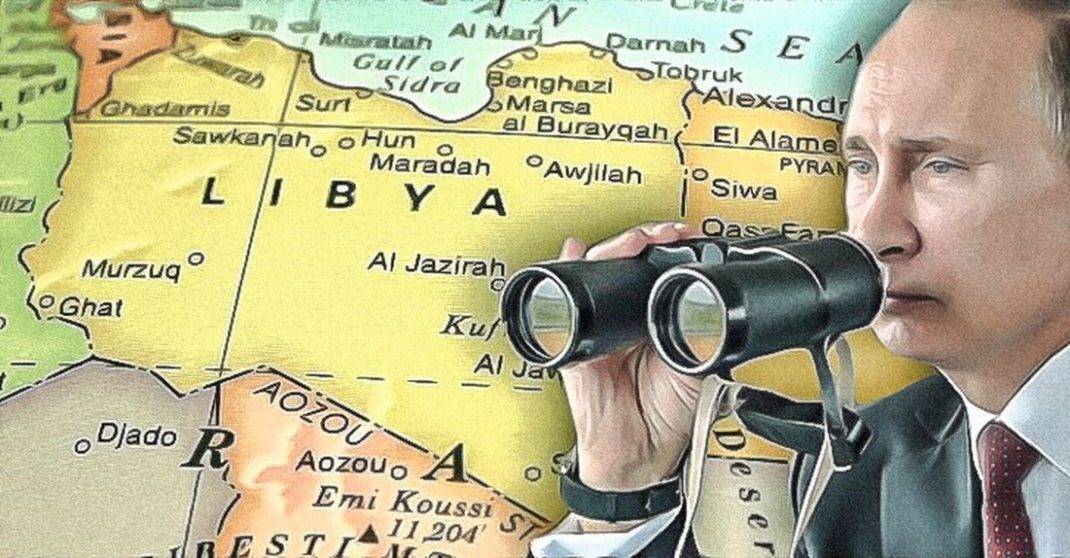By Anna Borshchevskaya
 As in other conflict zones, Moscow cares little about reaching a peace deal so long as it can outmaneuver the West strategically while securing port and energy access—with private contractors playing an increasingly important role.
As in other conflict zones, Moscow cares little about reaching a peace deal so long as it can outmaneuver the West strategically while securing port and energy access—with private contractors playing an increasingly important role.
The Kremlin is now openly treating Libya as another focal point of its Middle East activities.
After years of U.S. neglect, the country has turned into a proxy war playground, and President Vladimir Putin is vying to become the chief power broker.
Earlier this month, he tried (but failed) to get Khalifa Haftar to sign a ceasefire agreement in Moscow with Prime Minister Fayez al-Sarraj, head of the UN-recognized Government of National Accord (GNA).
Putin also participated in the January 19 Berlin conference aimed at getting the parties back on the path toward a political solution. And though the prospects for such a deal remain uncertain, Moscow’s involvement in Libya will continue either way.
Historically, accessing warm-water ports in the East Mediterranean has been of substantial import to Russian rulers as part of their effort to make the country a “great power” player in European politics.
During the 1945 Potsdam Conference, Joseph Stalin unsuccessfully attempted to claim trusteeship over Libya’s Tripolitania province.
Despite that failed bid, Libya emerged as an important arms client for the Soviet Union after World War II.
In the 1970s, dictator Muammar Qadhafi further opened up to Moscow, which provided thousands of personnel and massive amounts of military hardware to boost his activities, including the construction of better missile bases.
The zero-sum struggle with the West over geostrategic positioning and access to energy resources and ports continues to guide the Kremlin’s thinking today.
Putin began reviving ties with Libya soon after becoming president in 2000, and relations improved significantly after he met with Qadhafi in Tripoli in 2008.
Soon afterward, Moscow wrote off most of Libya’s nearly $5 billion debt in exchange for contracts on oil, gas, weaponry, and railways. Qadhafi also gave the Russian fleet access to Benghazi port.
In 2011, the NATO-led campaign in Libya cost Russia its longstanding access to Libya and its billions in contracts.
Yet Qadhafi’s grisly demise and the precedent of what the Kremlin perceived as a U.S.-led “color revolution” scared Moscow the most.
In 2012, Putin began a concerted effort to regain access to Libya while simultaneously expanding Russia’s overall naval capabilities.
In May 2013, two years before his intervention in Syria, Putin announced a permanent Russian Mediterranean task force.
If Moscow manages to strengthen its position in Libya for the long term, it would gain significant leverage over Europe and further access to the Middle East and Africa.
Libya’s deep-water ports of Tobruk and Darnah would be useful for the Russian navy logistically and geostrategically, especially in combination with Syria’s Tartus.
Leveraging the country’s extensive energy resources would be another prominent feather in Putin’s cap.
PUTIN’S LIBYA PLAY
Last October, a source familiar with the relationship between Haftar and Moscow told the independent Russian-language media outlet Meduza, “It was important to us back then [i.e., approximately 2015] that there wouldn’t be headlines like ‘Russia continues Middle East expansion: Libya is up next after Syria.’”
Yet the signs of this exact scenario coming to fruition were legion.
Haftar reportedly reached out to Moscow for support sometime around 2015. In exchange, he promised to give Russia the energy deals and port access it coveted.
Putin accepted the offer and began providing Haftar’s Tobruk government with military advice, diplomatic support at the UN, and even its own printed money.
For his part, the commander has made several trips to Moscow since 2016. In January 2017, he was invited to tour Russia’s lone aircraft carrier as it returned home from Syrian waters; some observers believe he promised Moscow additional access during this trip.
That same year, Moscow flew dozens of Haftar’s wounded soldiers to Russia for treatment. And in November 2018, the commander visited Moscow again.
Over this same period, press reports began to appear on the increasing presence of Russian trainers and shadowy private military companies (PMCs) in Libya, often to protect oil assets and provide advice.
Most recently, the Moscow Times reported earlier this month that Russian contractors fighting in Libya and Syria had received treatment at an elite Moscow hospital owned by individuals close to Putin, including his daughter.
And on the energy front, a joint Libyan-Russian oil and gas venture began operations in Benghazi last April.
Even as it tilted heavily toward Haftar, Moscow also built links with the Sarraj government. This two-headed approach is consistent with Putin’s regional strategy, which entails building contacts with all major players in order to position himself as a power broker.
Haftar’s refusal to give up his American citizenship and his general reputation as a difficult partner have contributed to Moscow’s dual approach as well.
For their part, Russian PMCs recently criticized the commander; at the same time, they conducted a public relations campaign on behalf of one of his domestic opponents, Qadhafi’s son Saif, seeking to boost his image last year in the context of a Libyan political campaign.
USING THE PMC MODEL TO GAIN ACCESS
Increasingly relying on PMCs as an instrument of foreign policy has been a hallmark of Putin’s strategy in many arenas. Over the past few weeks, Russia has flown hundreds of these mercenaries to Libya, most likely via Cham Wings airlines from Damascus to Benghazi.
They have reportedly appeared at al-Jufrah Air Base, among other locations. In terms of specific capabilities, these forces include snipers whose presence on the frontlines has caused spikes in GNA casualties.
Moscow has also likely provided them with drone jamming capabilities. According to Reuters, the U.S. military believes that either PMCs or Haftar loyalists used Russian air defense systems to shoot down an American drone, probably by mistake, outside Tripoli last November.
That same month, Haftar loyalists confirmed that they shot down an Italian drone. Yet being able to operate a Russian air dense system is a high-end skill that not many PMCs have, so these incidents suggest a rapidly growing level of sophistication on the ground and raise questions about the full extent of Russia’s presence there.
Russian PMCs pose broader problems as well. For one, their behavior does not fit within standard Western military definitions.
Their activities overlap between contractors, mercenaries, and other categories—there is no clear separation between military and private like one sees in the West.
There is also no clear policy or legal framework for Moscow’s actions; technically, PMCs are illegal even under Russian law. Once Moscow reaches agreements on economic or military cooperation in a given country, it has a legitimate reason to send personnel there, for example to provide security for companies undertaking resource extraction.
This gives Moscow a foothold, but it can—and often does—engage in other activities to expand its influence in said country and alter the regional balance of power.
One must also keep in mind that Russian PMCs are not entirely controlled by Putin—the interests of the various cronies and oligarchs in his circle can differ from his own, since they are chiefly interested in money.
For instance, Yevgeny Prigozhin, owner of the Wagner PMC firm, is mainly focused on Libya’s energy resources, according to Russian military analyst Aleksandr Golts.
This element adds a layer of complexity to Russian involvement, though Putin will still likely do whatever he can to ensure that PMCs in Libya advance his broader foreign policy goals.
CONCLUSION
During the Berlin conference, Kremlin-controlled press emphasized Putin’s power-broker position in Libya, circulating photos of European leaders huddling around him as if they were looking to him for guidance.
In reality, Moscow’s ability to influence Haftar remains questionable. Even so, Moscow can derive benefits from the diplomatic process without a genuine breakthrough.
First, its involvement in peace talks boosts Putin’s image, especially absent a greater U.S. role.
Second, Moscow is quite accustomed to muddling through unresolved conflicts in other countries while securing its foothold and gaining access to resources—or blocking others (chiefly Europe) from gaining said access.
Third, it seeks to create dependence on the Kremlin, a strategy that includes using the prospect of refugee flows from and through Libya as leverage over Europe. These efforts—not genuine conflict resolution—are Moscow’s forte.
Moreover, whenever Libya stops producing oil, global prices go up, which benefits the Kremlin. Indeed, oil prices rose to $65 per barrel recently, in part because Haftar stopped production on the eve of the Berlin talks.
The conference also reaffirmed international commitment to an arms embargo on Libya. Yet it is difficult to believe that such declarations will prevent Russia or other actors from sending arms to their local allies there.
Finally, Putin’s position in Libya and Syria may give him additional leverage over Turkey.
If Ankara gets too aggressive in Libya, he can pressure it in Syria, raising the prospect of further linkage between Russian activities on both fronts in the coming months.
In short, Moscow benefits from simply staying put in Libya and securing access via PMCs.
The United States and its allies should therefore seek ways to curb Russia’s PMC activities. In the end, only Washington has enough clout to bring a genuine resolution to the latest Libyan conflict.
***
Anna Borshchevskaya is a Senior Fellow at The Washington Institute, focusing on Russia’s policy toward the Middle East.
___________
The Washigton Institute





